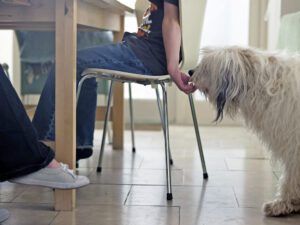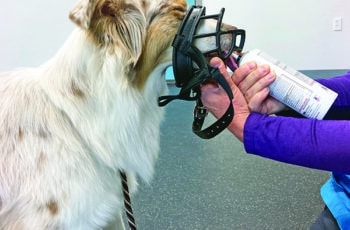
Credit: John Howard | Getty Images
If your dog skips his meals for a day or two but is otherwise acting fine – no diarrhea, no vomiting, normal heart and respiration – you should be OK holding off on a veterinary visit. But not any longer! And, if the fasting dog is a senior, a dog with any chronic health condition, a puppy, or appears at all ill, at a minimum, you need to call your veterinarian for advice.
Loss of Appetite in Dogs
Some health conditions can lead to a loss of appetite. A dog with kidney or liver problems may feel nauseous and not want to eat. Many of these dogs will approach their meals, drooling even, but will turn and walk away.
Check your dog’s mouth for any sign of injuries such as ulcers, a stick or bone caught across the roof of his mouth – it happens more than you may think! – or an electrical burn from chomping on a cord. Many of these dogs will act fine, at least for a while, despite not eating.
Some dogs just seem to be naturally finicky, like, this week beef is the favorite protein but last week only salmon would do. This is where it pays to know your dog.
Loss of Appetite in Breeding Dogs
If your dog is an intact male and you have an attractive girl in heat (basically ANY girl in heat is attractive), your boy may be perfectly healthy but in lust. This includes any bitch in the neighborhood, not just in your household.
For most males this will only last for a couple of days, right around when the female is in “prime time.” Provided he does not have any health problems that could be exacerbated by fasting for a few days, simply figure you are saving on dog food.
Another healthy-but-not-eating scenario can occur in a female who is pregnant and suffering from something similar to morning sickness. This tends to happen around two to three weeks post breeding. Generally, these females will eat something at some point during the day. Occasionally, even false-pregnant bitches will do this, too.
Adolescents
On to the non-sex-related anorexic dogs, although somewhat related. Adolescent males often will not eat well. Despite your most tempting offerings, they will walk on by. Meanwhile, they are burning up calories and can get quite thin. This is usually a stage somewhere in between 6 to 12 months of age. Most of them do eat something, but it can be very frustrating to owners. This too shall pass.
Canine Secret Eating
Then we get to the tricky non-eaters. First, be sure that someone else is not feeding your dog. Another family member, a kind neighbor, your cat (usually inadvertently on the cat’s part). Some dogs are such gluttons that they will eat these extras plus their own meals, but others admit they are full. This includes dogs who hunt and scavenge on their own. If your dog is out catching and eating squirrels or rabbits, he truly may not be hungry. It could also be a change in the dog’s bowl you haven’t noticed.
If your dog won’t eat, you have a small window of time to evaluate the situation, The better you know your dog, the easier it is to decide. Taking the dog’s temperature, pulse, and respiration and watching for diarrhea, constipation, and changes in urine output is wise. Keep your veterinarian in the loop if your dog is at all very young, old, or battling a chronic disease. We don’t want you to take chances, but you usually don’t have to panic either.


